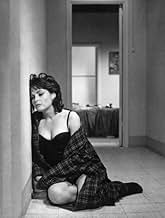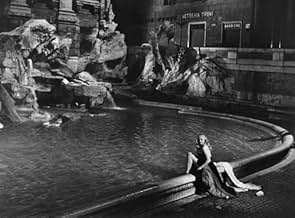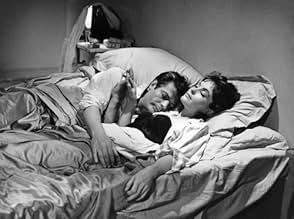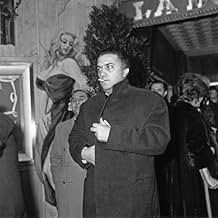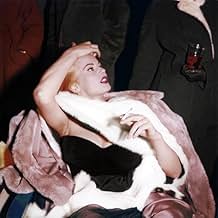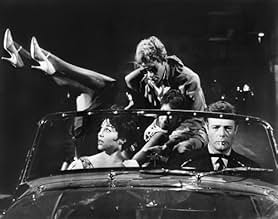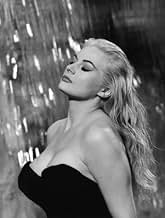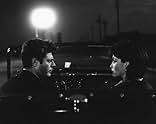Una serie de historias que siguen una semana en la vida de un periodista paparazzo que vive en Roma.Una serie de historias que siguen una semana en la vida de un periodista paparazzo que vive en Roma.Una serie de historias que siguen una semana en la vida de un periodista paparazzo que vive en Roma.
- Dirección
- Guionistas
- Elenco
- Ganó 1 premio Óscar
- 11 premios ganados y 12 nominaciones en total
Anouk Aimée
- Maddalena
- (as Anouk Aimee)
Magali Noël
- Fanny
- (as Magali Noel)
Resumen
Reviewers say 'La Dolce Vita' delves into themes of fame, decadence, and the superficiality of celebrity culture, using these characters to underscore the contrasts and contradictions within high society. The portrayal of it's characters enhances the film's satirical and critical perspective on the lifestyles and attitudes of the era, offering a nuanced commentary on the nature of fame and its impact on individuals and society.
Opiniones destacadas
In many ways, this has to be regarded as the defining film of its era. It presaged a new style of cinema. It had a fluid, dreamy, symbolic visual and narrative form, and its resonance stems from its visual set pieces and overall ambience. It is also a fascinating exploration of the lifestyles and attitudes of an incipient, flash, indulgent and directionless generation.
The film is mainly remembered for the iconic scene of Anita Ekberg ebulliently splashing her way into the centre of the Trevi Fountain, followed by an adoring Marcello Mastroianni. The scene is emblematic of the film in the sense that it represents characters who wish to break free from the constraints of previous generations but their efforts, while perhaps on the surface appearing daring and romantic, often lead to nowhere. There's a sense of searching but not finding: breaking free of one set of constraints only in order to meet another. Marcello, the film's protagonist and perhaps a representation of the director himself, wants to be free of his wife and he doesn't want to sell himself to the capitalist system, but what else is there to provide meaning to his life? He is failing as an artist and his romantic conquests seem empty and unfulfilling. He yearns for a time when life was more clearly defined and yet he loathes the responsibility and entrapment that that definition would impose. And so he drifts from party to party, a little less energetic, a little more cynical on each occasion.
La Dolce Vita shows us the new hedonism and society's burgeoning obsession with celebrity. It is responsible for the word "paparazzi", which came from the name of one of the supporting characters, and it features a very young Nico, who would go on to achieve fame with one of the defining bands of the '60s. The film is a bold and brilliant exploration of life as it was lived by the upper-classes and the emerging chattering classes of the time. It's an enthralling experience which is both sweet and sombre.
The film is mainly remembered for the iconic scene of Anita Ekberg ebulliently splashing her way into the centre of the Trevi Fountain, followed by an adoring Marcello Mastroianni. The scene is emblematic of the film in the sense that it represents characters who wish to break free from the constraints of previous generations but their efforts, while perhaps on the surface appearing daring and romantic, often lead to nowhere. There's a sense of searching but not finding: breaking free of one set of constraints only in order to meet another. Marcello, the film's protagonist and perhaps a representation of the director himself, wants to be free of his wife and he doesn't want to sell himself to the capitalist system, but what else is there to provide meaning to his life? He is failing as an artist and his romantic conquests seem empty and unfulfilling. He yearns for a time when life was more clearly defined and yet he loathes the responsibility and entrapment that that definition would impose. And so he drifts from party to party, a little less energetic, a little more cynical on each occasion.
La Dolce Vita shows us the new hedonism and society's burgeoning obsession with celebrity. It is responsible for the word "paparazzi", which came from the name of one of the supporting characters, and it features a very young Nico, who would go on to achieve fame with one of the defining bands of the '60s. The film is a bold and brilliant exploration of life as it was lived by the upper-classes and the emerging chattering classes of the time. It's an enthralling experience which is both sweet and sombre.
This is one of those films where I just don't want it to end as I enjoyed it so much. So many memorable and humorous scenes - Fellini successfully captured the atmosphere of picturesque Rome lifestyle. All of the characters are interesting, complex and I especially loved Anita Ekberg's performance! Amazing!
(first of all, sorry my poor english) Who, in this entire world, drunk as a horse in the middle of the night, never discovered the meaning of life, that it can be so easy and joyfull that hurts. This happens with a certain frequency. The big problem is, after all that, to face all the thoughts and conclusions in a sober monday morning, when everything is just real, concious and above all that sincere. This is the the big question and problem of Marcello Rubini, a reporter of a gossip magazines who has to deal with the fact that he tastes the same poison he spreads by leaving in a group of people which he sucks his living.
In a moment he is directing his papparazzi and, in the next, he is running away from them. He flows between all kinds of social circles and the only impression he gives is that it doesnt matter what kind of craziness you are getting into everything is a big cliché. From the mainstream world of a gorgeous actress who feels able to express opinions about everything (and we buy it), passing throught the religious world of the faith, and also an intellectual circle that gives a fake impression of freedom, everything turns out to be an escape. That blonde girl appears as a stroke of pureness and sincereness, something we should really look for, but we just dont. In the case of Marcello's life, writing is the solutions he always substitute for vain experiences. Something he likes and that he needs a young girl to tell him that. That litlle cute girl is a person Marcello would like to be, someone who faces the soberty of a monday morning with hopeness and happiness.
A masterpiece.
In a moment he is directing his papparazzi and, in the next, he is running away from them. He flows between all kinds of social circles and the only impression he gives is that it doesnt matter what kind of craziness you are getting into everything is a big cliché. From the mainstream world of a gorgeous actress who feels able to express opinions about everything (and we buy it), passing throught the religious world of the faith, and also an intellectual circle that gives a fake impression of freedom, everything turns out to be an escape. That blonde girl appears as a stroke of pureness and sincereness, something we should really look for, but we just dont. In the case of Marcello's life, writing is the solutions he always substitute for vain experiences. Something he likes and that he needs a young girl to tell him that. That litlle cute girl is a person Marcello would like to be, someone who faces the soberty of a monday morning with hopeness and happiness.
A masterpiece.
Returning to this film after many years, I was mesmerized for its entire three hours and could have stuck with it for even longer. More than just a parade of degenerate Sixties Eurotrash, all of human life is captured in these frames, from prostitutes living in flooded slum apartments to glittering nobility in their crumbling castles.
The common thread is the thoroughly captivating Marcello Mastroianni as the gossip columnist/aspiring novelist, later turned burned-out publicist. His relationship with the parade of females who inhabit his world, often fleetingly, is nuanced and authentic feeling, while the episode with his father, who shows up for an unexpected visit, is a delight that brought a wide smile to my face.
The unique, episodic structure of the film feels neither showy nor forced, and the film moves through its segments with the natural grace of a great symphony.
An added bonus for me was seeing a young Nico of Velvet Underground fame , looking relaxed and happy. Would that things always turned out that way for her.
In sum, a totally unique tour de force and, unquestionably, one of the greatest achievements in cinematic history.
The common thread is the thoroughly captivating Marcello Mastroianni as the gossip columnist/aspiring novelist, later turned burned-out publicist. His relationship with the parade of females who inhabit his world, often fleetingly, is nuanced and authentic feeling, while the episode with his father, who shows up for an unexpected visit, is a delight that brought a wide smile to my face.
The unique, episodic structure of the film feels neither showy nor forced, and the film moves through its segments with the natural grace of a great symphony.
An added bonus for me was seeing a young Nico of Velvet Underground fame , looking relaxed and happy. Would that things always turned out that way for her.
In sum, a totally unique tour de force and, unquestionably, one of the greatest achievements in cinematic history.
There really isnt a plot. This is about a tabloid photographer and some scenarios he gets into. All the characters seem vain, selfish and wanting more from life without actually knowing what they want. The Rome nightlife is brought to life here and there are many scenes at lavish parties where all the characters dont appear to have any emotional connection to one another. There are also disconnected Catholic themes throughout the movie. It leaves you questioning your own life and emptiness.
¿Sabías que…?
- TriviaThe famous scene in the Trevi Fountain was shot over a week in March, when nights were still cold. According to Federico Fellini (in an interview with Costanzo Costantini), Anita Ekberg stood in the cold water in her dress for hours with no trouble. Marcello Mastroianni, on the other hand, had to wear a wetsuit beneath his clothes, and even that wasn't enough. Still freezing, he downed an entire bottle of vodka, so he was completely drunk while shooting the scene.
- ErroresWhen Marcello and Maddalena arrive at the prostitute's apartment, a long electric cable (light?) can be seen attached to the right rear of the car, moving along until the car stops.
- Versiones alternativasIn the original American release, distributed by American International Pictures, the titles open with the AIP logo and appear over a shot of the sky with clouds. In the current release on DVD - and as shown on TCM - the title sequence is over a black background. When originally released, censors in several countries trimmed certain scenes, including the orgy near the end of the film.
- ConexionesEdited into La case du siècle: Cinecittà, de Mussolini à la Dolce Vita (2021)
Selecciones populares
Inicia sesión para calificar y agrega a la lista de videos para obtener recomendaciones personalizadas
- How long is La Dolce Vita?Con tecnología de Alexa
Detalles
- Fecha de lanzamiento
- Países de origen
- Sitio oficial
- Idiomas
- También se conoce como
- La dolce vita
- Locaciones de filmación
- Villa Giustiniani-Odescalchi, Bassano Romano, Viterbo, Lazio, Italia(abandoned castle scenes)
- Productoras
- Ver más créditos de la compañía en IMDbPro
Taquilla
- Total a nivel mundial
- USD 217,420
- Tiempo de ejecución2 horas 54 minutos
- Color
- Relación de aspecto
- 2.35 : 1
Contribuir a esta página
Sugiere una edición o agrega el contenido que falta

Principales brechas de datos
What is the streaming release date of La dulce vida (1960) in India?
Responda
![Ver Trailer [English SUB]](https://m.media-amazon.com/images/M/MV5BNjE3MTU3OTItN2I0NS00YzU2LWE1ZTctZDQ3Y2I1NDc4MGMxXkEyXkFqcGdeQXRyYW5zY29kZS13b3JrZmxvdw@@._V1_QL75_UX500_CR0)
![La Dolce Vita: [2-Disc Collectors Edition]](https://m.media-amazon.com/images/M/MV5BZTY2ZTg3YmEtZDZkMS00MmFkLThhMjItMWVmN2NlNmJhZGZjXkEyXkFqcGdeQXVyNzU1NzE3NTg@._V1_QL75_UX500_CR0)

